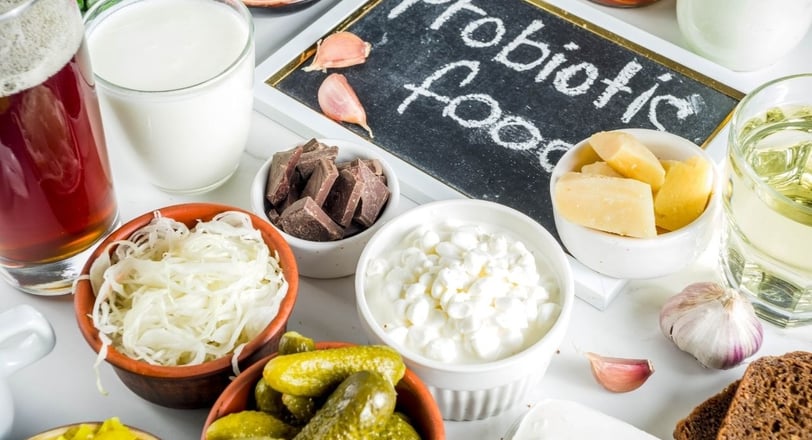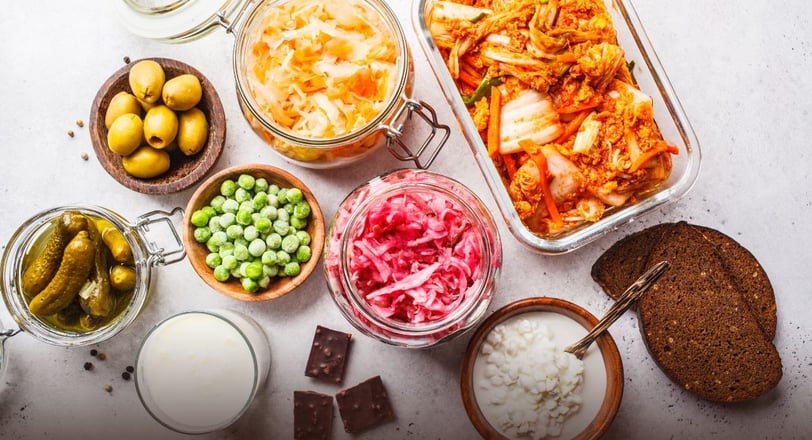Gut-Brain Connection: How Fermented Foods and Probiotics Support Mental Health
Have you ever felt butterflies in your stomach before a big event? Or noticed how stress can lead to digestive discomfort? These common experiences are a testament to the powerful link between your gut and brain. This connection, known as the gut-brain axis, reveals how your digestive system directly influences your mood, emotions, and cognitive function. Emerging research shows that fermented foods and probiotics play a significant role in maintaining gut health and, by extension, mental well-being. In this article, we’ll explore the science behind the gut-brain connection, the role of fermented foods and probiotics, and how you can use them to support both your digestive and mental health.


The Gut-Brain Connection: A Two-Way Street
The gut and brain communicate through a network of biochemical signals that travel via the vagus nerve and the bloodstream. This connection is maintained by:
The Enteric Nervous System (ENS): Sometimes called the “second brain,” the ENS in the gut controls digestion and sends signals to the brain.
The Microbiome: Trillions of bacteria in your gut produce neurotransmitters like serotonin and dopamine, which regulate mood and behavior.
Inflammation and Immune Response: An imbalanced gut can trigger inflammation, which affects brain function and mood.
Gut Health and Mental Health
Recent studies suggest a strong correlation between gut health and mental health conditions like anxiety, depression, and even cognitive disorders. For instance:
Over 90% of serotonin (the “feel-good” hormone) is produced in the gut.
Individuals with depression often have less diverse gut microbiota compared to those without.
The Role of Fermented Foods and Probiotics
Fermented foods and probiotics are natural allies for a healthy gut. Here’s why:
Fermented Foods
Contain live cultures of beneficial bacteria that help maintain gut microbiota balance.
Examples include yogurt, kefir, sauerkraut, kimchi, miso, tempeh, and kombucha.
Probiotics
Live microorganisms that, when consumed in adequate amounts, provide health benefits.
Available in supplements or fortified foods like certain yogurts and beverages.
How Fermented Foods and Probiotics Impact Mental Health
Boosting Neurotransmitter Production
Beneficial gut bacteria produce neurotransmitters like serotonin, GABA, and dopamine, which regulate mood and reduce anxiety.Reducing Inflammation
Probiotics and fermented foods help lower gut inflammation, which can otherwise contribute to mental health issues.Regulating the Stress Response
A balanced gut microbiome can modulate the hypothalamic-pituitary-adrenal (HPA) axis, reducing the impact of stress on the brain.Improving Cognitive Function
Studies have shown that probiotics like Lactobacillus and Bifidobacterium improve memory, focus, and overall brain health.
Scientific Evidence Supporting Fermented Foods and Probiotics
Mental Health and Probiotics
A 2016 review published in Frontiers in Aging Neuroscience found that probiotics reduced symptoms of depression and anxiety by improving gut microbiota.Cognitive Function
A study in Nutrients (2019) showed that participants who consumed probiotics experienced better cognitive performance compared to those who did not.Stress Reduction
A 2017 study in Psychosomatic Medicine demonstrated that fermented foods reduced stress levels in young adults.


How to Incorporate Fermented Foods and Probiotics Into Your Diet
1. Start Small
Introduce fermented foods gradually to allow your gut to adjust.
2. Add These to Your Meals
Breakfast: Greek yogurt with fresh fruit and granola.
Lunch: Add sauerkraut or kimchi to sandwiches and salads.
Dinner: Incorporate miso soup or tempeh into your main dishes.
3. Choose High-Quality Probiotic Supplements
Look for supplements with diverse strains of bacteria, including Lactobacillus and Bifidobacterium. Consult a healthcare provider for recommendations.
4. Make Your Own Fermented Foods
DIY options like homemade sauerkraut or kombucha can be fun and cost-effective.
FAQs About Gut Health and Mental Well-Being
Q: Can everyone benefit from fermented foods and probiotics?
A: Most people can, but individuals with specific health conditions, such as histamine intolerance or compromised immune systems, should consult a doctor first.
Q: How long does it take to see results?
A: While some people notice improvements within weeks, lasting changes in gut and mental health may take a few months of consistent consumption.
Q: Are all probiotics the same?
A: No. Different strains target specific issues, so it’s important to choose the right type for your needs.
The Bigger Picture: A Holistic Approach to Gut-Brain Health
While fermented foods and probiotics are powerful tools, overall gut health relies on a balanced lifestyle:
Eat Fiber-Rich Foods: Prebiotics (found in bananas, garlic, and onions) feed beneficial gut bacteria.
Stay Hydrated: Water supports digestion and nutrient absorption.
Limit Processed Foods: Excess sugar and artificial additives can harm gut bacteria.
Manage Stress: Practices like yoga, meditation, and regular exercise promote gut-brain harmony.
Conclusion
The gut-brain connection underscores the importance of taking care of your digestive system to enhance your mental health. Fermented foods and probiotics are simple yet powerful additions to your diet that support a balanced gut microbiome, improve mood, and sharpen cognitive function.
Start small—add a spoonful of sauerkraut to your meals or a daily probiotic supplement—and notice the positive changes in your mental clarity and emotional well-being.
Your health is in your hands, and the path to a happier, healthier you may just start in your gut.
Products Reviews
Disclaimer
The statements on this website have not been evaluated by the Food and Drug Administration. The articles and products advertised are not intended to diagnose, treat, cure, or prevent any disease.
The content of the website and the products advertised are based on the opinions of the authors and are provided solely on an "AS IS" and "AS AVAILABLE" basis. You should do your own research and confirm information with other sources when seeking information about health issues, and always carefully review the information with your healthcare professional before using any of the protocols presented on this website and/or the products indicated. Neither Drops&Pills nor the authors are engaged in rendering medical or similar professional services or advice through this website or the products, and the information provided is not intended to replace medical advice offered by a physician or other licensed healthcare professional. You should not construe the recommendation of the products by Drops&Pills as an endorsement by Drops&Pills of the opinions expressed herein, or any guarantee of any strategy, recommendation, treatment, action, or application of advice made by the authors of the products.
Some names and personally identifiable information on this site have been changed to protect the privacy of individuals.
Drops&Pills is the publisher of the articles on this site. Drops&Pills' role as publisher does not constitute an endorsement, approval or review of the products advertised herein or any claim, statement or opinion used in the promotion of those products.
For product support, please contact the suppliers.
For purchase and order support, please contact the platform you placed the order through.
For support with article information, please contact Drops&Pills here.
*Free shipping according to the rules on the product page.
Natural Products for Better Health
© Drops&Pills Research 2025 All rights reserved
Contacts
contact@dropsandpills.com
